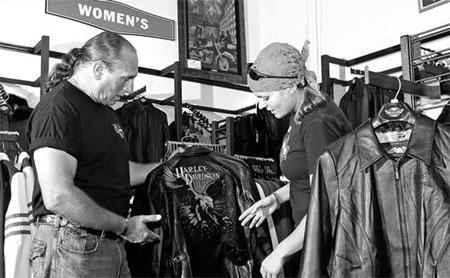
San Diego Harley-Davidson owner New York Myke Shelby speaks with his clothing manager Victoria Stuever about a leather jacket in San Diego, California. Harley-Davidson Inc, the biggest US motorcycle maker, says it never takes a break from efforts to protect its world-famous brand in China. Bloomberg News
Since establishing a representative office in Shanghai in 2005, Harley-Davidson never takes a break from efforts to protect its world-famous brand in China.
"The Harley-Davidson brand is one of the most important and valuable assets of Harley-Davidson. Protection of Harley-Davidson trademarks prevents consumer confusion and deception and protects the authorized Harley-Davidson dealership," said Steve Wasser, managing director of Harley-Davidson Asia Inc.
In November, the Second Intermediate People's Court of Beijing Municipality ruled that the operator of the Chrome Horse retail stores - Beijing Harley Trading Center, which is not an authorized seller of Harley-Davidson merchandise - bears liability for trademark infringement and unfair competition in connection with its false advertising and sale of certain unauthorized Harley-Davidson branded products and services.
In June 2007, Harley-Davidson Motor Co filed suit against Beijing Harley Trading Center and related parties, including Li Haijun and Li Yang, and Beijing Roader ("Beijing Lude") Motorcycle Parts Co Ltd, alleging trademark infringement and unfair competition stemming from operations at the Chrome Horse stores.
Chrome Horse was selling illegally obtained Harley-Davidson motorcycles, related parts, and genuine and counterfeit Harley-Davidson branded merchandise.
In addition to requiring that Beijing Harley Trading Center take immediate action to stop infringing Harley-Davidson's rights, the Court also ruled that the use of "ha lei" violates fundamental principles of good faith and constitutes unfair competition.
It also ruled that "ha lei" is the commonly used and immediately recognized name of Harley-Davidson in China and the corresponding Chinese transliteration of the "Harley" trademark.
One of the defendants, Beijing Lude, has appealed the Court's decision.
"We appreciated and greatly welcome the judgment from the Second Intermediate People's Court of Beijing. It reaffirms China's commitment to IPR protection. Harley-Davidson Motor Co's lawsuit seeks to end the trademark infringement by Beijing Harley Trading Center," said Linda Heban, Harley-Davidson chief trademark counsel and vice president.
"Protecting the public from confusion helps to ensure that our customers are provided with a genuine Harley-Davidson experience - before, during and after the sale," said Heban.
Harley-Davidson, the top American premium motorcycle manufacturer, produces heavy street motorcycles, custom motorcycles and tour motorcycles.
Its motorcycles in China are priced above 100,000 yuan.
Harley-Davidson serves its China customers through its authorized dealers in Beijing, Shanghai, Qingdao and Hong Kong.
"Harley-Davidson keeps developing its dealership network in China, we have our commitment to our existing and future dealerships, and this lawsuit also protects our existing and future dealerships," said Wasser.
Harley-Davidson has a range of 3C-certified motorcycles that comply with Chinese vehicle regulations, allowing them to be imported and sold in China.
"Harley-Davidson authorized dealerships provide not only genuine Harley-Davidson motorcycles, but also genuine parts and accessories, MotorClothes, other general merchandise, and most importantly, after-sales service from factory-trained technicians and dealership-sponsored HOG (Harley owners group) activities, which build the genuine Harley-Davidson experience as a whole," said Wasser.
"Moreover, we do have other activity to protect our brand, consumers and dealership - for instance, an action in October 2006."
That's when the Jiaonan City Administration of Industry and Commerce conducted a raid in Jiaonan, Shandong province, which resulted in the confiscation of more than 3,200 counterfeit Harley-Davidson jackets and clothing items and more than 2,700 counterfeit Harley-Davidson labels.
"Take a 2006 result of the Jiaonan raid as an example, which has prevented a substantial amount of counterfeited Harley-Davidson items from being distributed in the Greater China market," Wasser said. "Counterfeited merchandise is a challenge for a lot of well-recognized and strong global and local brands in China."
A genuine leather jacket displayed in Harley-Davidson stores costs between 3,000 and 9,000 yuan, and a shirt on average is priced at 500 yuan.
In some outdoor bazaars and small shops, 700 yuan can buy a Harley-Davidson leather jacket. And with a little bargaining, 80 to 100 yuan buys a shirt.
Harley-Davidson also deals with the IPR issue in markets outside of China as well, and has very strong trademark enforcement practices in place to deal with infractions.
"Harley-Davidson is committed to protecting its intellectual property rights in China and the rest of the world," said Wasser.





